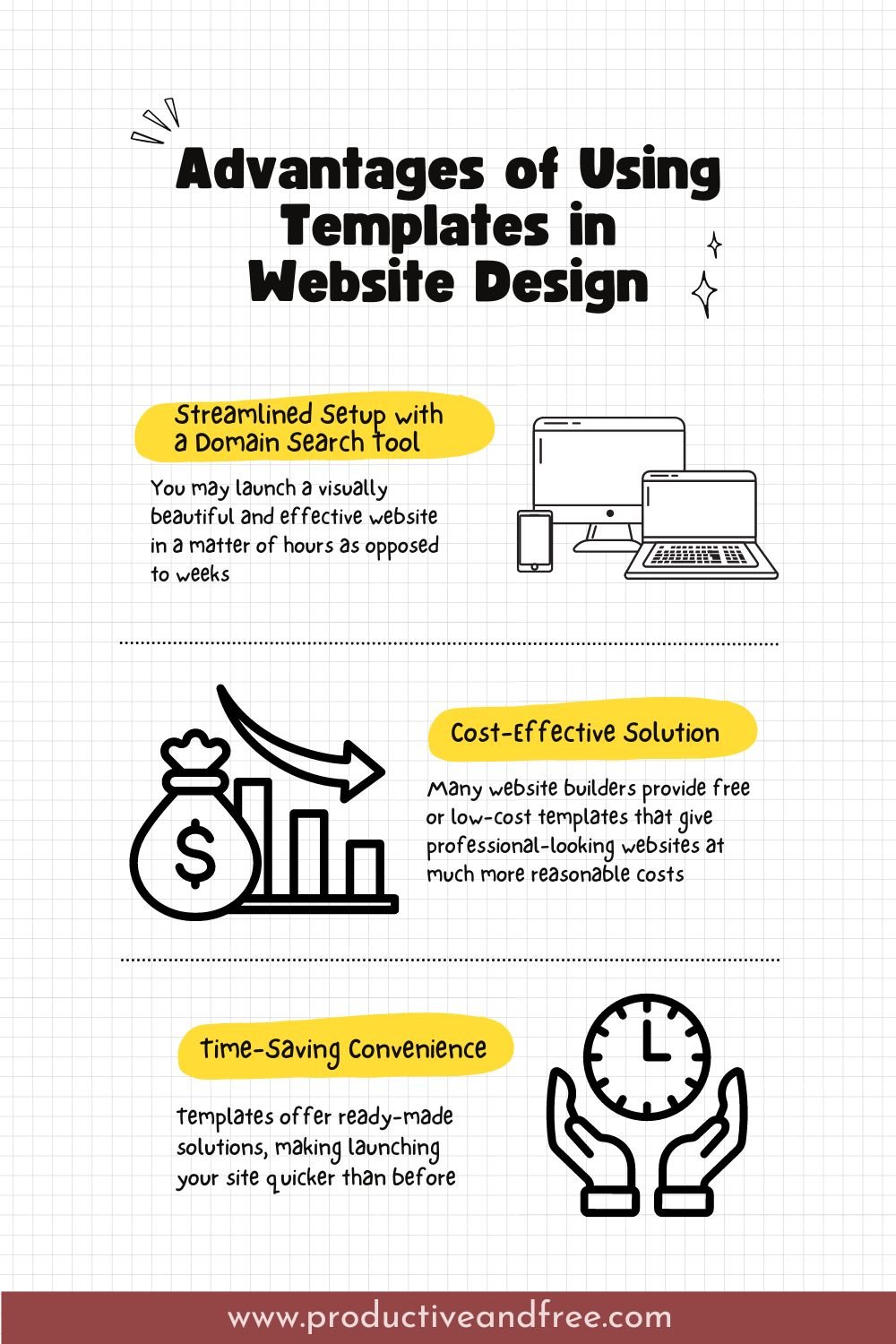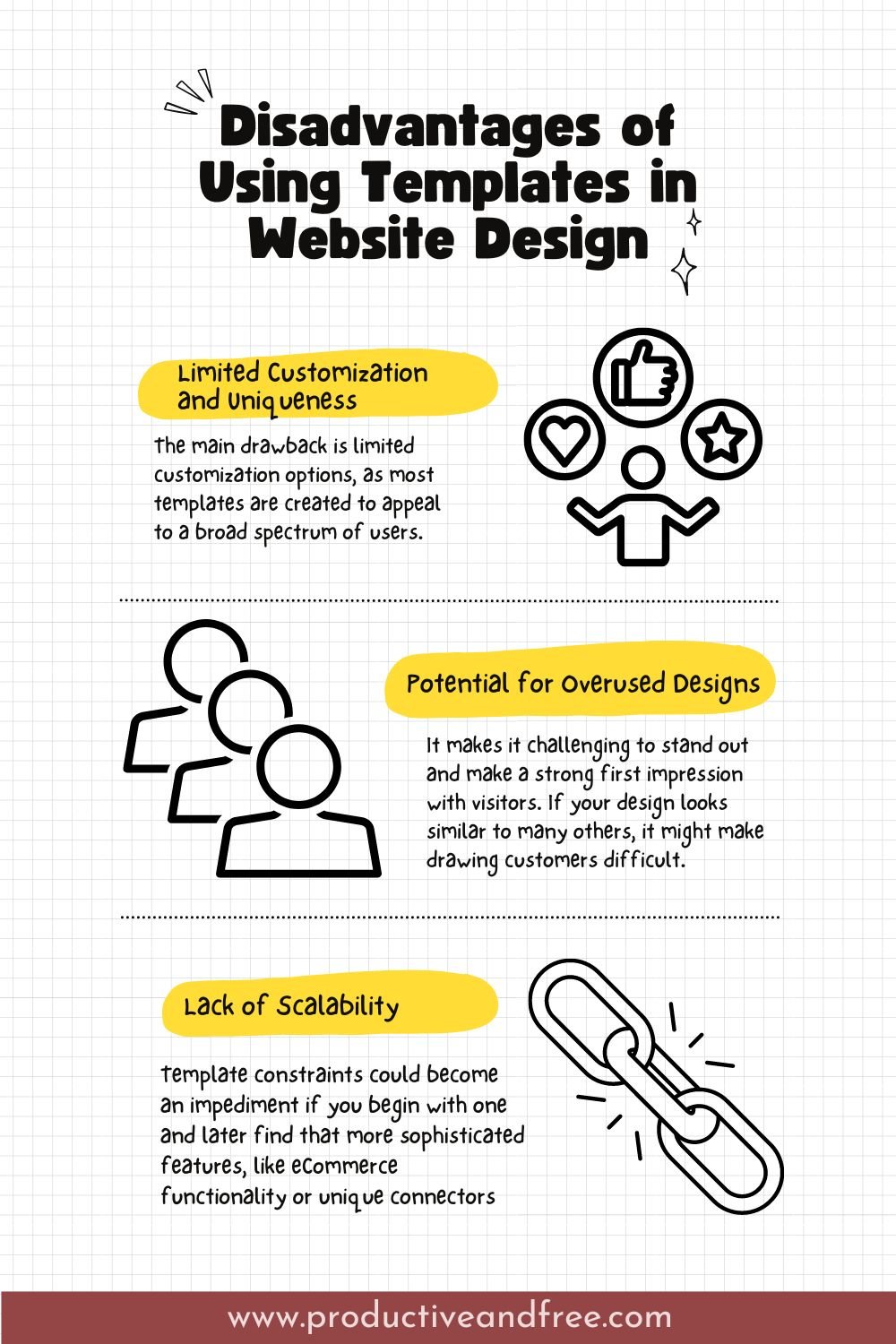When looking at a website, first impressions are 94% design-related. When building a website, one of the most important decisions you'll face is whether to use a pre-designed template or create a custom design from scratch.
While templates offer several benefits, there are certain disadvantages as well. In this blog post, we will look at the pros and cons of using templates in website design to help you decide if they’re the right choice for your project.
Advantages
Streamlined Setup with a Domain Search Tool
The simplicity of use is one of the main benefits of utilizing a website template. Using a template, you may launch a visually beautiful and effective website in a matter of hours as opposed to weeks. This is especially helpful for individuals or small enterprises who have an urgent need for an online presence.
Using domain search tools can further streamline the process, as coming up with a suitable domain name is essential when creating a website from scratch. To ensure the URL for your website is both relevant and memorable, use a domain search tool to save time during setup. Enter your desired keywords into the domain search engine to quickly find available domains, saving you time from brainstorming or manual checks. This allows you to swiftly move forward with the design process and secure your domain name.
Cost-Effective Solution
Cost is usually the primary concern when embarking on any web design project. Custom designs can cost thousands of dollars, while templates provide more cost-effective alternatives. Many website builders and CMSs provide free or low-cost templates that give professional-looking websites at much more reasonable costs.
Startups and small businesses alike can benefit immensely from utilizing templates, as they allow budgets to be allocated toward other crucial areas, like marketing or product development. Even with premium templates, their costs often represent only a fraction of those associated with custom designs. This makes templates an attractive option for those trying to control expenses.
Time-Saving Convenience
Time is another critical factor in web design. Custom website development can take weeks or months, depending on its degree of customization and complexity. Templates offer ready-made solutions, making launching your site quicker than before.
Time-saving features of templates are especially advantageous to those working under tight deadlines or limited resources, such as small business owners who must get their website online before an imminent product launch. Most templates provide preloaded features and functionalities, so you can focus on adding your content and tailoring the design according to your brand identity.
Disadvantages
Limited Customization and Uniqueness
Templates offer many advantages, but they also present several drawbacks. The main drawback is limited customization options, as most templates are created to appeal to a broad spectrum of users. Therefore, they might not provide enough freedom for you to design an individual website.
Customizing a template to perfectly reflect your brand can be challenging without technical expertise. Although, most templates allow some degree of customization—changing colors, fonts, and layouts. These options may not always meet all your needs. If you want a site that truly stands out and embodies its brand's identity, then using a template may not be the right answer.
Because templates are widely utilized, the risk is that your website could look similar to others using the same template. This lack of individuality could prove detrimental in industries where standing out from competitors is crucial. If having an eye-catching online presence is essential to your business's success, custom designs might be worth exploring instead.
If you’re selling on Shopify and want to make your design templates more customizable and unique, Foxify Smart Page Builder is your solution. With its easy-to-use visual editor, you can add new elements to your templates and place them wherever you want. With Foxify, you can create stunning and memorable pages easily and quickly, with no coding needed.
Potential for Overused Designs
The fact that templates may be misused is another drawback of utilizing them. Popular themes have become the cornerstone of millions of websites, which makes it more challenging to stand out and make a strong first impression with visitors. If your design looks similar to many others, it might make drawing customers difficult.
This matter is especially important for companies in the creative sectors because drawing in customers requires uniqueness and eye appeal. Although they might be a wonderful place to start, templates might not give the degree of originality needed to set your business apart. A bespoke design could be well worth the money if you want to prevent the possibility that your website will become unrecognizable.
Lack of Scalability
Your website's requirements could alter as your company expands. On the other hand, templates frequently have limited scalability. Template constraints could become an impediment if you begin with one and later find that more sophisticated features, like eCommerce functionality or unique connectors, must be added. When this occurs, custom designs or complete redesign may become necessary; both options can be costly and time-consuming processes.
Final Thoughts
Templates offer an efficient, economical, and simple way to quickly build a website. Ideal for individuals and small businesses in a rush without breaking the bank, templates may also present limited customization, common designs, or technical restrictions that hinder site performance or growth.
Before selecting a template for your website, carefully consider your goals, budget, and the importance of making it distinctive. By considering these factors, you can ensure the template fits in seamlessly with your needs now and as your business evolves.
Pin or save this post for later!
Share in the comments below: Questions go here




































